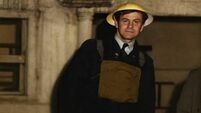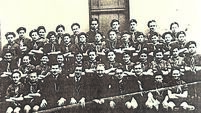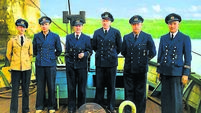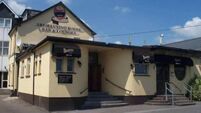Throwback Thursday: Recalling the shops we knew in Cork city
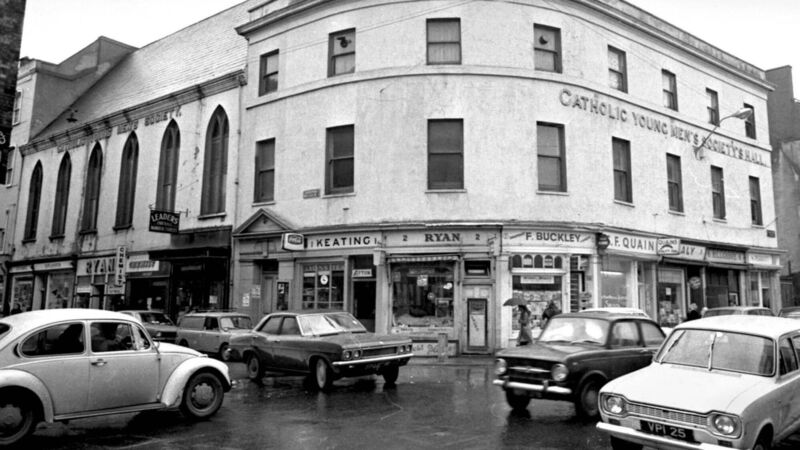
A view of the Cork Catholic Young Men’s Society (CCYMS) Theatre in Castle Street, Cork, in February 1972. A Throwback Thursday reader remembers Levis shop on the street, where her mother bought extra-thin rashers
Throwback Thursday reader Katie O’Brien wonders if anybody else remember Levis’ shop on Castle Street in Cork city?
“There, the friendly staff supplied the tastiest sausages, ham, and bacon,” she recalls.
“My mother always asked for her rashers to be sliced extra thin, which they were delighted to do. I attribute my lifetime preference for thin crisp rashers to those early days shopping with my mother, watching with fascination as the great slicer worked its delicate way through the bacon, the paper-thin pieces falling neatly on to the greaseproof paper below.
Katie adds: “And do others recall when Maddens got one of those barbecuing machines and placed it outside the door on Bridge Street, so that passers-by could enjoy the irresistible scent of roasting chickens turning on the spit?
“It made your mouth water as you made your way down towards Patrick’s Bridge, and must have tempted many a housewife to expend the extra and solve that day’s dinner problem. (This, of course, was well before the days of pre-prepared, grab-it-and-go meals in every supermarket.)”
Meanwhile, Tim Cagney writes to say that reading about city life in times past on Throwback Thursday reminds him of a shop which once existed on MacCurtain Street, run by the Healy sisters, a trio of elderly spinsters.
“It had double-fronted windows and was located near another small shop called The Cova, which used to have a large replica of an ice-cream cone outside,” says Tim.
“A fourth sister had actually ventured along the bridal path, and lived with her husband just two doors down from my parental home on Gardiners Hill.
“Needless to say, I knew her simply as Mrs O’Donovan - in those days it was not deemed good manners to know the Christian names of your elders (even our parents addressed their adult neighbours as Mr & Mrs).
“Similarly, I never knew the husband’s first name, or what occupation he followed. My one and only encounter with him was when, as a child, my fingers became trapped by a falling window-sash, and Mr O’Donovan was hastily summoned to release me.
“I never saw him again - I just knew when he died, after which my mother would visit his widow, and they would have hushed conversations in her dimly-lit living-room.”
Tim adds: “I never got to know the first names of her sisters who ran that shop either.
“There was a small entrance, but a long interior, which provided ample space for the pupils of nearby CBC (myself included) to spend happy times eating sweets and supping minerals.
“For quite a few, this extended to smoking single cigarettes bought in the hop.
“Whilst personally avoiding the ‘fags’, my favourite treat was a bottle of Coca-Cola, served with a straw, of course. This would be enjoyed whilst chatting earnestly with any one of the ladies, who were aware of my connection with their married sister.
“Coca-Cola, in those days, had different properties to the stuff available today. It certainly had a kick to it.”
Tim continues: “The interior of ‘The Healy Shop’ provided a glorious haven for us schoolboys, where much banter was enjoyed during class-breaks. I often thought the three sisters enjoyed our company.
“Regrettably, such Utopia was brought to an end, some time around 1965. The principal of CBC decided that students congregating in a smoke-filled shop during their leisure hours, was not befitting the school image, and declared the venue out of bounds.
“Luckily, those I frequented the den with sat the Leaving Cert in 1966, and so were automatically released from the ban.
“On a typical Saturday afternoon, following an enjoyable jaunt around Pana, I would renew acquaintance with the Misses Healy, quenching my thirst with the customary bottle of Coca-Cola.”
Tim says the sisters all lived in a large terraced house on Coburg Street, adding: “I think it stood at three levels. One day, the entire red-brick frontage fell-away. The interior of the dwelling remained exposed to the elements for a considerable period of time, the privacy (not to mention the dignity) of the occupants being protected by sheets of polythene.
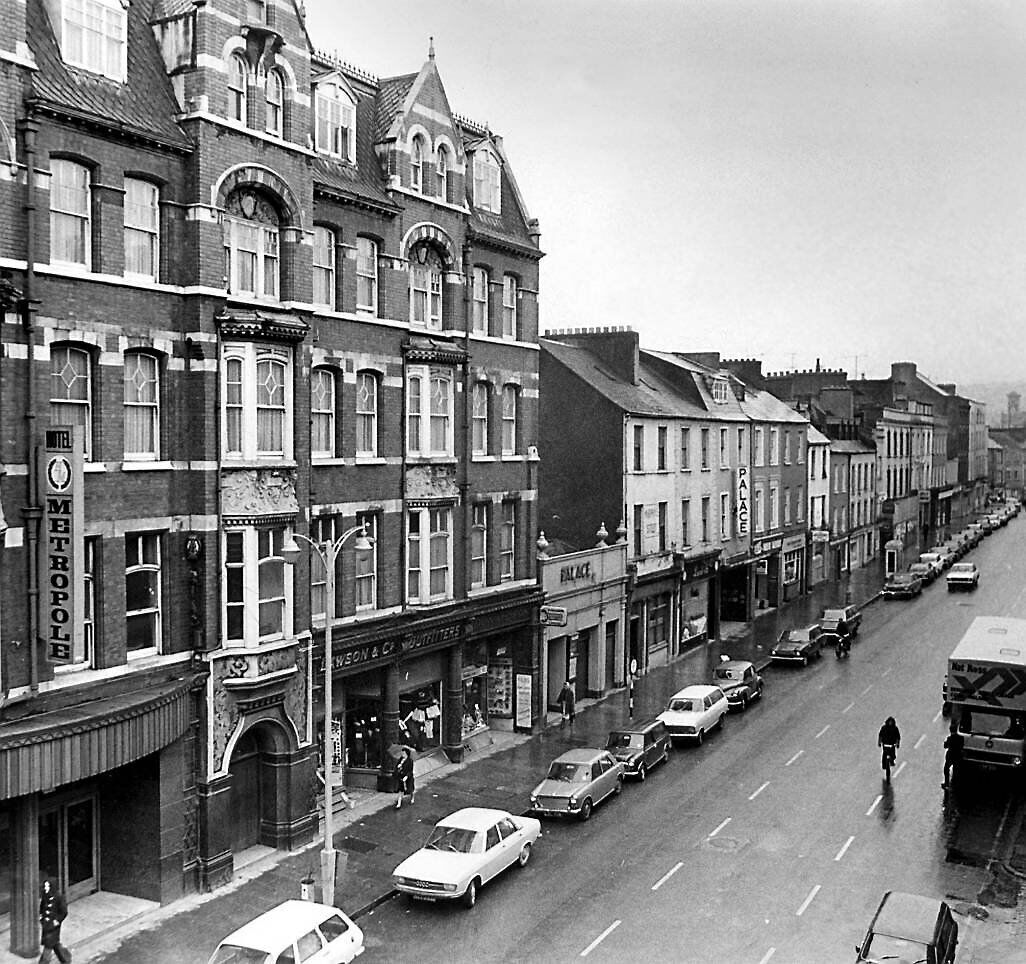
“All I know is that I left Cork in January, 1973 - I can’t remember whether the fallen wall had been replaced by then, but I never saw any of the sisters again.
“Around three years ago, I made a return visit to Cork. I took a stroll on MacCurtain Street and tried to pinpoint where the old shop once stood. To my sadness (tinged, perhaps, with a little shame), I couldn’t.”
Now, Joe Terry, who last week shared his poignant memories of emigrating from Cork on the Innisfallen in 1960, has been prevailed upon to reveal another set of recollections – this time the joyful day he actually sailed back to Cork a decade later.
Although, as he points out, it was not quite as welcoming as he had expected.
“Tis a half a century and more ago, October, 1970. I’m out on the open deck of the MV Innisfallen, my bride standing close by, her arm around my waist. Aware of the ship slightly swaying, and listening to the purr from the engine room, we inhale the early-morning breeze.
“We had previously travelled this route when we came to Ireland on our honeymoon and for my brothers’ weddings. This journey is different; we’re coming back to the old sod for good.
“I have a job lined up. Everything is hunky-dory. We’re loaded with coins, having struck the jackpot with one-arm bandits on the voyage from Swansea. Luck is on our side.
“My recently-acquired, green Morris Minor van I bought for £35 to transport our personal belongings, is on the cargo deck. The packed van contains Millie, our budgie in her cage, and my Sony 200 tape recorder, with reels of music tapes.
“Also squashed in is a box of my tools for when I arrive at J T McCarthy & Co on Kyrl’s Street in Cork city, to begin my new job.”
Joe continues his recollection: “Approaching Cork harbour, I point out Kelly’s Cove, the scene of my earliest memories, when the MV Irish Plane went aground on the night of a bad storm in 1947. I recall my father took me there, aged four, with my older brother. We watched from the cliff-top as the crew were hauled one by one over the chasm between the inclined, grounded cargo ship and the cliff, to safety inside the breachers buoy.
“In no time, the Innisfallen passes by Roches Point lighthouse. My bride and I are in silent, pensive moods. I’m thinking of our glorious future ahead in Ireland, where the ‘grass is greener’, away from the smog in the ‘big smoke’, London.
“The Innisfallen steadily cruises upstream, passing White Bay, where my aunt used to allow me, as a young boy, to take my shoes off and paddle in the sandy seawater.
“I point out to my bride the high ground from where, in my youth, I saw Irish Navy tug-boats pulling targets, and watched in awe as plumes of water rose when practice military shells launched from Carlisle Fort hit the surface.
“We pass by Ireland’s only oil refinery at Whitegate; its long jetty stretching into the harbour, the metallic towers glistening from the early-morning sun, the oil storage tanks covering Corkbeg Island.
“I explain to my wife that the island once had a 50-room luxury hotel where my parents celebrated their marriage 30 years earlier, in 1940, their wedding party breakfast costing 3/9d per head.
“The Innisfallen, veering to port, passes the tidal Owenacurra river estuary, bringing me back to ten years ago when I gave in my notice of leaving my first paid job at Cloyne Mineral Company’s operational headquarters at Ballinacurra. I had been an assistant to the manager, keeping timesheets, answering the telephone (Midleton 51), delivering wage packets to workers at the Ballynacurra processing plant, the open mining pits at Kilboy Cross and the washing plant at Lisanley, both adjacent to Cloyne village.
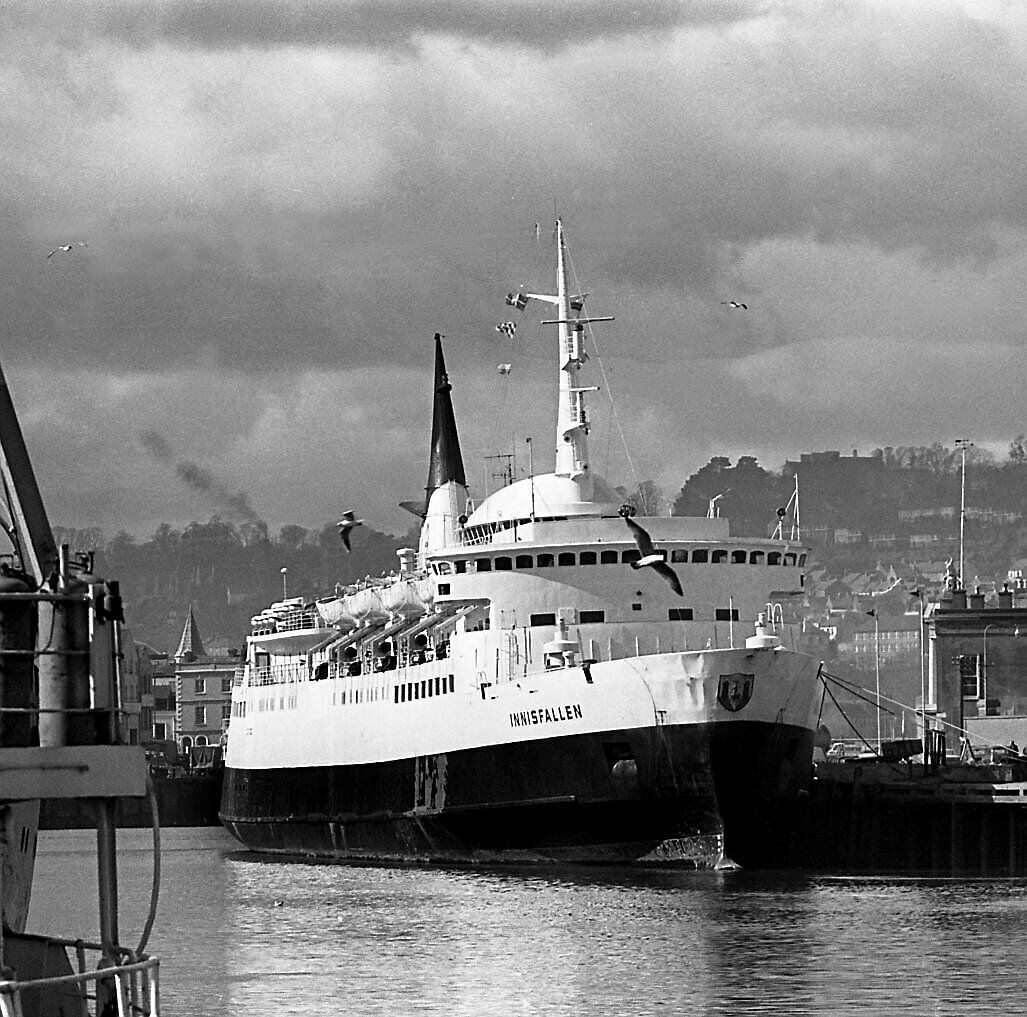
“Part of my remit was stock control and quality control testing the end product, before it was deemed suitable for shipping to Arklow pottery and Waterford foundries.
“After 11 months, I asked for a rise to my £4 per weekly wage. Alas, it was declined. So, I gave in my notice and within a week I had’ taken the boat’ at Penrose Quay in Cork city to begin a ten-year adventure as an emigrant in England.
“It was not until I checked my leaving reference from Cloyne Mineral Company that I learnt of my official job description, ‘a stock control clerk and production supervisor’.
“The document came in handy later, when being interviewed for a barman’s job at the College Park Hotel in Harrow Road, London, helped by references from Midleton Technical school and my parish priest. The latter wrote on October 17, 1960: ‘He is an intelligent boy of excellent character and comes from a respectable family.’ The priest had evidently forgiven all of the sins I told him in the confession box, of the flesh and the mind.
“Next, the imposing edifice of Cobh Cathedral, then Verolme Dockyard, came into view. Moving by its towering 40-ton cranes, I have no idea that within months I would be employed in that enterprise as a pipe fitter, involved in the construction of the MV Leinster, sister-ship of the roll-on roll-off ferry we are on. While I was there, my wife gave birth to a beautiful daughter; finishing my day’s work, a Greek engine room engineer presented me with a bottle of duty-free Jameson whiskey to ‘wet the baby’s head.’
“As the Innisfallen is due to dock at 7am, in less than half an hour, my wife and I end the reminiscing and sightseeing and make our way to the Morris van.
“We sit inside, our worldly possessions packed in behind us. Soon, we will be motoring to my parents’ home in Cloyne to begin the next chapter of our union in ‘Ireland of a thousand welcomes’.
“But, as we are about to drive off the vessel, there is a snag. Customs officers deemed I must pay excise tax on my van on account of my moving back to Ireland for good, and impounded it, locked behind a high chain-linked fence.
“Our worldly possessions are piled upon the gravel concourse of the Tivoli ferry terminal. My bride and I consult one another; it could be raining. Keen not to give Millie a negative impression of Ireland, I place a coat over her cage. I tell the customs man truthfully that I had paid £35 for the banger and would pay whatever else was required now, but he was a stickler, and insisted on following procedures. An assessment had to be made by Customs and Excise.”
However, alternative transport arrived to save the day for Joe and his Bride.
“Thankfully, my father arrives in his Volkswagen Beetle, sheep trailer hooked on behind. In no time, we are on our way, our possessions in the trailer, the arched arm of Millie’s cage in the air.
“The van was later released when the duty, ascertained at £10, was paid.
“The irony; if I had told a white lie and said I was visiting on holiday, we would have been allowed to continue our journey!”
Not quite the warm welcome you expected then, Joe. But you came home, you and your wife (not forgetting Millie the budgie) and that’s the main thing! Thank you for sharing.
Let’s hear everybody else’s memories. Email jokerrigan1@gmail.com or leave a comment on our Facebook page: www.facebook.com/echolivecork.
